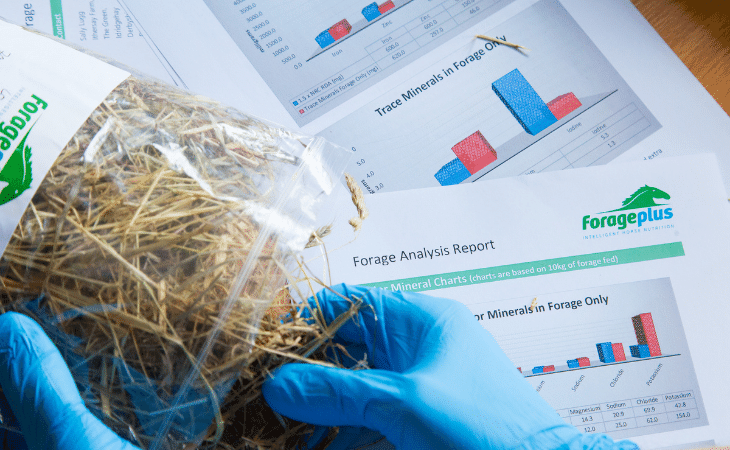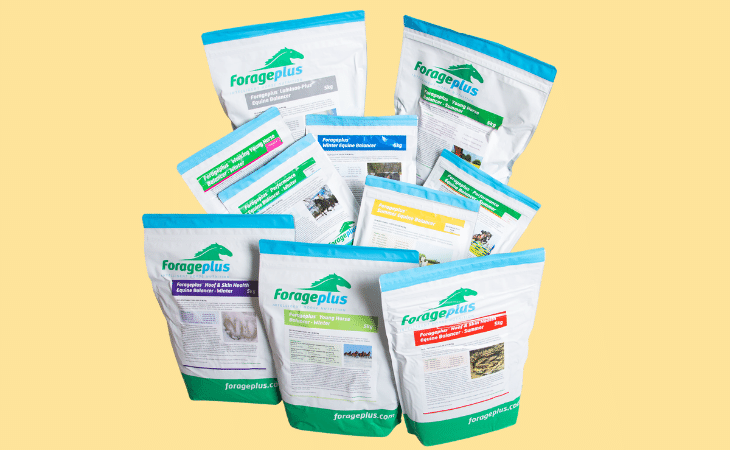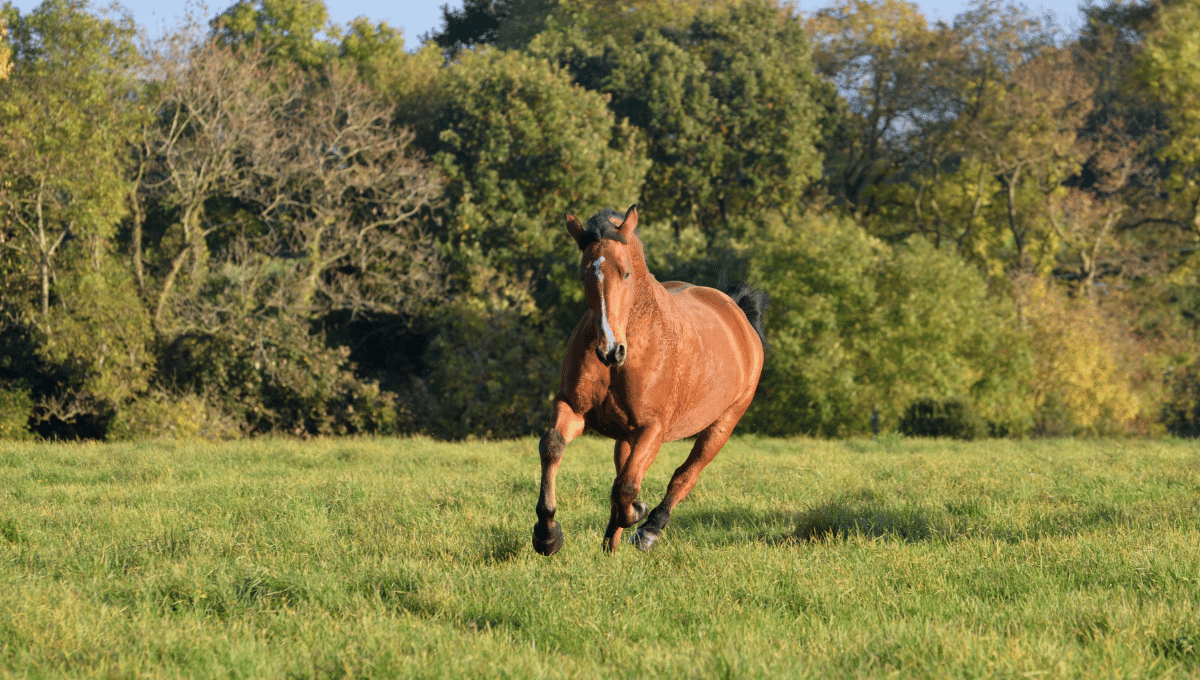Many owners ask the question ‘Is there enough protein in horse diets’? If you want to find out more about protein for horses then Forageplus™ can answer your questions.
It is impossible to tell what the level of protein is in your horse grass, hay or haylage by just looking at it. Forage protein levels are affected by growing temperature, rainfall and nutrient levels in the soil. In addition, the quality of the crude protein in forage can be affected by the way amino acids have formed in relation to levels of certain minerals in the soil.
Here in the UK through the hundreds of forage analyses, we carry out each year we have found that amounts of protein in horse diets are often at both a poor level and of poor quality. Many forages, particularly grass in spring, will cover basic and higher needs for protein but many samples of hay and haylage show poor protein amounts.
Statistically, the average is well below that needed for an adult horse even at maintenance. Where you have a good doer, and that hay or haylage is restricted to control weight, then the picture is even worse with many of these horses being very deficient in protein.
The table below shows the amount of protein an average 500kg horse needs for all the levels of work, including those doing no exercise who are classified as being at maintenance.
| Protein needs 500kg horse | |
|---|---|
| Maintenance | 540 grams |
| Light Work | 630 grams |
| Moderate Work | 720 grams |
| Heavy Work | 1000 grams |
| Pregnant Mare | 1340 grams |
| Lactating Mare | 2303 grams |
| Growing Young Horse | 1014 grams |
The following table shows Forageplus™ statistical analysis of UK hay and haylage samples collected over a number of years. The percentages are based on 100% dry matter rather than as-fed.
| Year | DE (MCal/Kg) | Protein % in Hay |
|---|---|---|
| 2014 | 1.750 | 5.938 |
| 2015 | 1.714 | 6.673 |
| 2016 | 1.733 | 6.883 |
Average DE and protein levels in UK forage 2014 -16, calculated using multivariate analysis
Now let’s look at what these results mean when you calculate how much protein will be available to a 500 kg horse eating 10kg of forage listed from each year. The dry matter has been calculated to be 85% which represents many hays here in the UK. Be aware, however, that dry matter content can vary so these amounts will vary depending on the dry matter figure, with lower dry matter figures resulting in lower protein amounts.
| Year | Percent of Protein | Protein Provided by 10kg of Hay (85% dry matter) |
|---|---|---|
| 2014 | 5.9% | 501.5 grams |
| 2015 | 6.6% | 561.0 grams |
| 2016 | 6.8% | 578.0 grams |
The table shows that the average amount of protein in hay and haylage in the UK falls short of what is needed as a minimum daily amount for a 500kg horse. Specifically, if we take the 2016 level then many horses will only have enough protein for life at maintenance, as soon as they start light work they will be short of even the minimum amount of protein needed each day if only fed forage as hay or haylage.
Adequate amounts of protein in horse diets are vital to keeping horses healthy, supporting muscle maintenance and development and many other important processes connected with supporting the health of skin and hooves and maintaining strong robust and resilient health.
The table below shows you exactly how much protein will be available to each horse in each category, what the surplus and deficit will be on just forage and what the surplus and deficit will be on forage and 1 kg of a concentrate bucket feed of 10% protein fed per day.
| Category of horse | Daily protein needs 500kg horse | Deficit or surplus of protein contained in 10 kg 6.8% protein hay | Deficit or surplus of protein contained in 10 kg 6.8% protein hay plus 1kg of 10% protein concentrate feed |
|---|---|---|---|
| Maintenance | 540 grams | surplus 38 grams | surplus 138 grams |
| Light Work | 630 grams | deficit 52 grams | surplus 48 grams |
| Moderate Work | 720 grams | deficit 142 grams | deficit 42 grams |
| Heavy Work | 1000 grams | deficit 422 grams | deficit 322 grams |
| Preganant Mare | 1340 grams | deficit 762 grams | deficit 662 grams |
| Lactating Mare | 2303 grams | deficit 1725 grams | deficit 1625 grams |
| Growing Young Horse | 1014 grams | deficit 436 grams | deficit 336 grams |
You can see now that by testing hay or haylage you can look at the protein in horse diets so that the levels are adequate for the age of your horse and the work level of your horse. Breeding horses and young horses need especially high levels of protein and supplying the correct levels is crucial for healthy growth and development. Older horses often need higher levels of protein to maintain muscle mass as their digestion often becomes less efficient.
So if you have any issues with hoof health, skin health, pot belly appearance, poor muscling and failure to thrive it is wise to find out how much protein is in horse diets each day. You should carry out an analysis or assume that your horse is short and needs additional protein in the form of a higher quality forage or a high fibre bucket feed to replace some of the lower level hay or haylage fed.
Where a horse is on restricted forage, working at a moderate to heavy level, needing to maintain or recover health, elderly, growing or breeding it is especially important to understand that protein from hay or haylage alone is unlikely to provide enough available protein.
As well as protein level it is important to look at the quality of that protein. The quality of protein affects the range of amino acids available to horses. To be certain of maintaining the best horse health certain amino acids which are commonly low in all forage, grass, hay and haylage should always be supplemented each day.
Find out more about protein quality by reading this article
Find out about how to feed young horses the right amount of protein
To be certain of enough protein being available to horses to maintain strong healthy keratin for optimum hoof, skin and coat quality and maintenance and development of healthy muscles you should consider carrying out a forage nutritional analysis of your hay or haylage.
This is particularly important for the maintenance of breeding stock, young growing horses, large heavy-boned horses, elderly horses and horses in heavy work such as racing, endurance, hunting or eventing.
Remember when you test horse grass, hay or haylage samples they have to be representative. If you can’t do this then consider using one of our ‘forage-focused’ horse feed balancers which have been formulated against the statistical analysis of the hundreds of forage samples we tested for our clients. Our balancers are nutritionally focused supplements rather than broad-spectrum, cover the usual deficiencies in UK forage and are matched to NRC minimums and ratios.

Analysis Services
Forageplus provides a range of analysis services for horse hay, haylage, grass, soil and water. We can tell you if your forage is suitable for a laminitic, if there is a need for soaking, if there is sufficient protein or if there are any antagonist minerals or mineral deficiencies. Read more below.

Horse Feed Balancers
Our forage focused horse feed balancers are of the highest quality, vitamin and mineral supplements designed to balance the total horse diet to the hay, grass, or haylage your horse eats. Forageplus balancers are formulated using scientific forage analysis with reference to the NRC guidelines.


